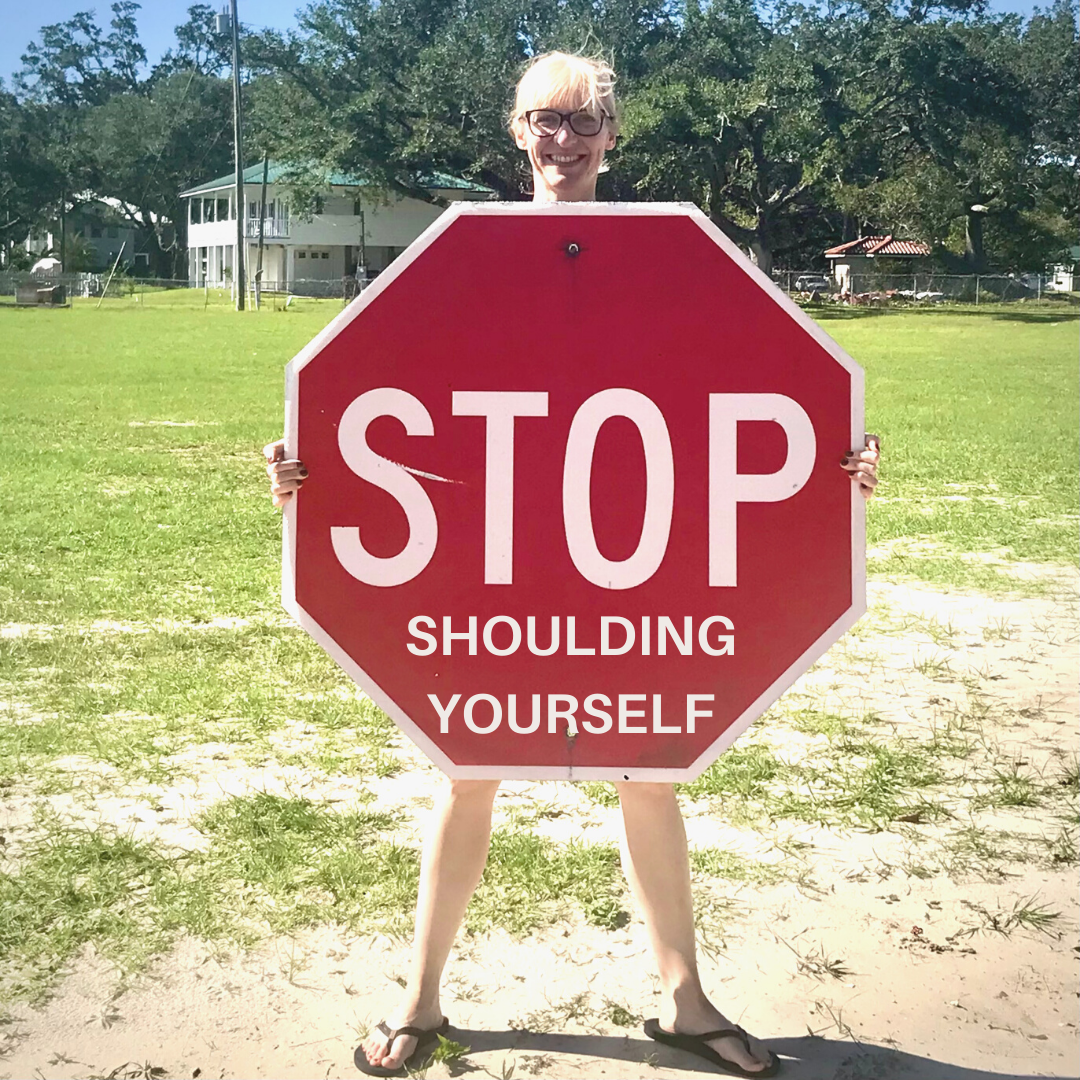Stop Shoulding Yourself
I was born on my brother's second birthday. Yep! We are two years apart exactly.
Being two years younger and highly impressionable, he would tell me what I should do (and still often does), knowing I would most likely do it. I quickly learned it was him tricking me into doing something that would either get me in trouble or things he didn't have the guts to do himself.
To this day, when people tell me I should do something and dump unsolicited advice on me, I instantly feel annoyed and defiant.
Whether their comment meant well or not, placing the word “should” in the sentence often conveys that I'm inadequate and I need to change something to fulfill their hopes or expectations of me. Inadvertently, I resist their words and often feel more anxious and confused.*
*Another reason why coaches never tell our clients what they “should” do!
Yet, I have used the same language in the past with myself whenever attempting to kickstart something into action.
"I should downsize my stuff."
"I should work on my business more."
"I should eat better."
"I shouldn't buy that!"
“I should be more productive!”
Wow, those all sound SUPER fun! *eye roll. It's right up there with, "I should take out the trash."
No one likes or truly wants to do chores!
While some shoulds can temporarily help move you into action (and get the mundane tasks done like paying your taxes), over-shoulding can have harmful effects.
"Shoulding yourself" comes from psychologist Clayton Barbeau. It means putting pressure on yourself to do or be something based on what you think you're supposed to do or be.
Whatever comes after the should is an obligation, not necessarily a genuine desire. When you over-should, it's often coming from a place of lack, shame and inadequacy. Insecurities and anxiety can go up, and your sense of self-worth can go down.
This can breed inaction and stagnancy, so the more you feel like you "should" do something, the less likely you'll actually do it.
So how do we get out of the habit of shoulding on ourselves (and others)?
Become more aware of your words.
Get more specific with what you want.
Take action.
When you hear yourself shoulding in your head, what makes it a “should” and not a “want”?
When you aren't taking action, it's often because of an internal resistance such as fear of failure, feeling it's too complicated or that it’s an obligation. We either manifest a story about what could go wrong, making assumptions based on our history, or it's too hard or mundane to start.
For example, maybe you wanted to start eating better this new year. So you set a daily habit of eating 12 servings of fruit and vegetables. You start off the first few days great, but then life happens. Maybe you forgot to go to the grocery store or went out to eat more than you anticipated, or perhaps you are craving a cheeseburger, and YES, the lettuce, tomato and onion count!
You didn't fail!
You set yourself up from a framework of obligation and not desire.
You make the rules!
So, stop shoulding yourself with obligatory energy and change your words.*
*I sort of feeling like I am telling you want to do here, so take this as a tip and not a demand!
Instead of "I should eat better," ask yourself, "What is one small thing I know I can accomplish and WANT to experiment with to start eating better?"
Then get specific.
Maybe the action step is to try a new recipe once a week. Or, if you don't know how to cook, the action could be to take a cooking class online.
Whatever it is, get specific on what sounds exciting so that you can say things like "I can try that!" or even better, "Hell yes! I WANT to do that!”
Words matter and a simple reframe can shift your energy from obligatory to excitement.
And that leads to my last point.
Take action. Even if it's a two-minute task.
Motivation usually comes after effort, not before.
When you have something weighing on you that is both a “should” and a “want,” but your motivation is low, take action, even if it's a baby step.
The more you act, the more you'll find what works for you and the more motivated you'll become.
For example, when I was struggling with my mental health, I knew exercise helped, but mentally I was not motivated. So instead of saying "I should exercise," I made a two-minute action of putting on my workout clothes and putting my earbuds in with running music on.
It took just a few minutes AND upped my motivation enough to get me running out the door.
Find your two-minute action that amps your mojo and giddy up!








